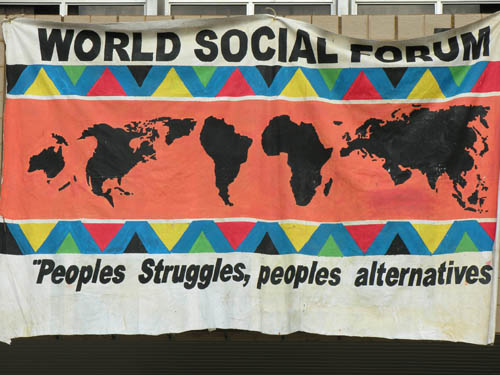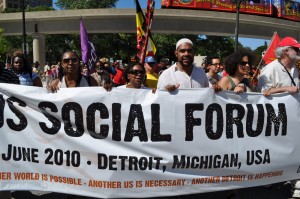From Feminist Critique to Social Transformation: Lessons from Social Forum
By Rose M. Brewer

From 2012 Forum
A little over seven years ago, January 20-25, 2007, I was in Nairobi, Kenya at the World Social Forum. For those unfamiliar with the forum, it is the global gathering of the world’s peoples, the dispossessed, genders, ethnicities, cultures, and regions. The World Social Forum was established in 2001 in Porte Alegre, Brazil. For many years the forum was held at the same time as the World Economic Forum (WEF). The WEF takes place in Davos, Switzerland.  There the dominant economic actors, nations, and corporations discuss the global capitalist system, which enriches so few. They articulate an economic strategy of dominance rooted in transnational capital. The World Social Forum is the global counterpunch.
There the dominant economic actors, nations, and corporations discuss the global capitalist system, which enriches so few. They articulate an economic strategy of dominance rooted in transnational capital. The World Social Forum is the global counterpunch.
By bringing together activists, grassroots leaders, academics, NGOs, students and others from all over the world, the World Social Forum has meant a political space, time and place to begin articulating a new vision of justice and equality for the world’s peoples. It is, at its most stirring, a gathering of those committed to social transformation of the current world order. This means that humanity, in all our complexity, must move together in deep relationality, cohesion, and care for the people and the planet.
The social forum is my point of departure for thinking about social transformation. My remarks flow from that space of energy, care and a vision that extends beyond critique. Social transformation requires a different political dynamic and sensibility, a different meter if you will. It means a radical re-imagining, practice and theory of change–of how we move with and for ourselves- to create another world. It is personal, collective, but fundamentally systemic. It requires clarity and meaning rooted in the fact that we must be clear about this political moment. We must vision and transform our consciousness. We must be strategic and connected to create that world. Thus social transformation is a deeply dialectical process. That is, change does not happen linearly in the same degree or with the same tempo, but catalytically.
It is 2014, and I am committed to another social forum. This time it is in the United States, slated for 2015 in multiple sites, including Philadelphia, Pennsylvania, and Jackson, Mississippi. It will be the 3rd social forum in the United States, what the World Social Forum calls a regional forum. Regional forums have happened in sites such as Bamako, Mali and other parts of the world. So, shortly after the World Social Forum was held in Nairobi, Kenya, the first United States Social Forum took place in Atlanta, Georgia in June 2007.

The social forum in Atlanta was held in the aftermath of Hurricanes Katrina and Rita, those unnatural disasters which exposed the violence of the American state toward the poor, largely Black, but across the complexities of genders, ethnicities, ages, disabilities. The days at that first USSF were not always easy or uncomplicated, containing multiple contradictions, but the forum articulated the catalytic energy of those committed to creating another world, another U.S. The second United States Social Forum was held in Detroit, Michigan in 2010. Detroit represents a clear lesson of the violence of late capitalism but also the unvanquished will and creativity of those most hurt. The Detroit social forum drew thousands, local and global, connecting in the vision and practice of creating another world. Movement building occurred through Peoples Movement Assemblies held before, during, and after the Detroit forum.
Coming together in spaces such as the social forums pushes us to think historically, systemically, and strategically. The historic negative contact and power relationships between Europeans and the majority of the world’s peoples are the facts of imperialism and colonialism intertwined deeply with heteropatriarchy. And, complexly the capitalist world system today creates a polygot of transnational elites, not all white or male. Yet the social forum process reawakens us to the rich cultural legacy of reimagining and re-creating by those most marginalized. The social forum process opens up a space to connect to our multiplicities, the imperative of moving from critique to transformation. The first point is to seek clarity about our theory and practice of liberation in this complex, and complicated space and time. The second point is to know that this is a critical conjuncture to reconsider where we stand –the political moment- and where we might go-the political imperative of vision.
Thus these lessons, I believe, can be gleaned from the social forum process though still unfinished and incomplete:
- The imperative of the world’s people coming together to articulate and practice the transformation of transnational, heteropatriarchal, white supremacist capitalism means that this commitment must be at the center of our theory and practice. This is the profound and critical lesson of revolutionary struggles all over the world as they converge in social forum spaces. In a movement for social transformation we simply cannot be race, class, gender reductionist but must move with a mediated understanding of the deep interrelationality of social forces to center our movement building.
- Social transformation is advanced with the embrace of the indigeneity, Africanity, Asian/Pacific and Latina corpus of our lives across sexualities, classes, race, and borders. In this era of neoliberal capitalism the political economic crush of profit, privatization and security state realities are infused with cultural and ideological meanings. The false discourses of colorblindness and postracial stand side by side with the discourses of inferiority, unworthiness, criminality used to justify and rationalize deep levels of exploitation and inequality
- We must learn from the long duree of the best of the freedom struggles historically and the still emerging social forum process. That social transformation entails the complicated spaces of contest, organizing, consciousness, vision through the everyday of ordinary people who, as Miss Ella Baker wisely asserted, are capable of extraordinary things. Indeed it is the deep refusal to be defined from without, even in the context of highly determinative structural inequalities, that should inform our actions as historical and material subjects.
This current period requires a complex theoretical and practice understanding of the intersectional and movement building possibilities of this political moment. Surely, if there is a lesson to be drawn from the social forum process it includes the hard and difficult question of whether the social forum extends its praxis far enough to think/act through the complicated gender, sexuality, class, race, ethnicity and national spaces the masses of humanity occupy.
 The challenge for all of us committed to social transformation is not simply to exhort change and critique systems but to connect deeply to praxis rooted in our connection to one another. This connect must happen in theory but most demandingly in practice. The quest is to build a movement within the U.S. and globally. We know in the forum process many organizations still locate in either/or single axis analysis. So our press must continue to be building in interconnection and care through all of our multiplicity. This is the corner store of movement building for a transformed world.
The challenge for all of us committed to social transformation is not simply to exhort change and critique systems but to connect deeply to praxis rooted in our connection to one another. This connect must happen in theory but most demandingly in practice. The quest is to build a movement within the U.S. and globally. We know in the forum process many organizations still locate in either/or single axis analysis. So our press must continue to be building in interconnection and care through all of our multiplicity. This is the corner store of movement building for a transformed world.
If you are interested in getting to connected to the work of United States Social Forum3 go to the website for additional information: http://www.ussocialforum.net/
________________________________________________
 Rose M. Brewer, Ph.D. is a long time activist scholar. She is the Morse Alumni Distinguished Professor of African American & African Studies at the University of Minnesota-Twin Cities. She publishes extensively on radical Black feminism, political economy, social movements, and the Black Liberation Movement. She is a core organizer of the United States Social Forum and is one of the editors of The United States Social Forum: Perspectives of a Movement, 2010. Her deep commitment to ending racism, national oppression, sexism, imperialism, and economic exploitation in the U.S. and globally took root in Black student activism and local community struggles for social change. The struggle for her continues to be about fundamental social transformation. She is a member of the Accountability and Coordinating Committee of USSF3 and co-facilitates the USSF Gender Justice Working Group.
Rose M. Brewer, Ph.D. is a long time activist scholar. She is the Morse Alumni Distinguished Professor of African American & African Studies at the University of Minnesota-Twin Cities. She publishes extensively on radical Black feminism, political economy, social movements, and the Black Liberation Movement. She is a core organizer of the United States Social Forum and is one of the editors of The United States Social Forum: Perspectives of a Movement, 2010. Her deep commitment to ending racism, national oppression, sexism, imperialism, and economic exploitation in the U.S. and globally took root in Black student activism and local community struggles for social change. The struggle for her continues to be about fundamental social transformation. She is a member of the Accountability and Coordinating Committee of USSF3 and co-facilitates the USSF Gender Justice Working Group.
References
Brewer, Rose M. (2010). “The Social Forum Process and the Praxis of Race, Class, Gender and Sexualities.” In Social Change, Resistances and Social Practices. Richard A. Dello Buono and David Fasenfest, eds. Leiden: Brill, 57-72.
Burnham, Linda. (2001). “The Wellspring of Black Feminist Theory.” Southern University Law Review 28:3, 265-270.
Combahee River Collective Statement. (1977). (last accessed February 18, 2012 http://historyisaweapon.com/defcon1/combrivercoll.html)
Karides, Marina, Walda Katz-Fishman, Rose M. Brewer, Alice Lovelace, and Jerome Scott. (2010). United States Social Forum: Perspectives of a Movement. Chicago: Changemaker Publications.
Mohanty, Chandra. 2003. Feminism Without Borders. Durham: Duke University Press, 2003.
Robinson, C. (1983). BlackMarxism: The Making of the Black Radical Tradition. London: Zed Books.



Pingback: Beyond the Beyond: closing and opening - The Feminist Wire | The Feminist Wire